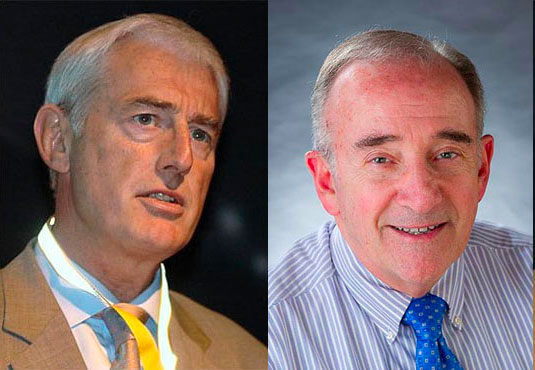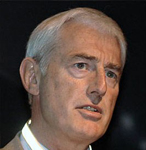John Chapman Articles

Atherogenicity of apoB-containing particles: The Trilogy of LDL, Lp(a) and remnants
Reports from the 19th Virtual Closed Scientific Expert Meeting of the Editorial Board John Chapman
read more »
Lipoprotein(a) and atrial fibrillation – Is there a link?
PCSK9 Forum Co-editors Professors John Chapman and Henry Ginsberg discuss recent data. Atrial fibrillation (AF) is the most common arrhythmia, affecting about 0.5% (circa one in 200) of the worldwide population (1). Moreover, as populations age, prevalence has increased dramatically (2). Due to the associated risk…
read more »
Reducing residual risk: Are cholesterol crystals the next target?
Professor John Chapman Sorbonne University, Pitié-Salpetrière University Hospital, National Institute for Health and Medical Research (INSERM), Paris France Cardiovascular disease is the worldwide leading cause of mortality, responsible for about one-third of all deaths (1). Much of this burden is attributable to atherosclerotic cardiovascular disease…
read more »

LDL cholesterol lowering and effects on plaque: what can we learn from INTENSITY-HIGH?
INTENSITY-HIGH: Investigating the Lowest Threshold of Vascular Benefits from LDL Cholesterol Lowering with a PCSK9 mAb Inhibitor (Alirocumab) in Patients with Stable Cardiovascular Disease The landmark PCSK9 inhibitor trials – FOURIER and ODYSSEY OUTCOMES – established the cardiovascular benefits of lowering LDL cholesterol to very…
read more »
Proof-of-concept: Gene-editing for PCSK9 inhibition
Prof. John Chapman Pitié-Salpêtrière University Hospital, Sorbonne University, and National Institute for Health and Medical Research (INSERM), Paris, France. Cholesterol-rich low-density lipoprotein (LDL) is indisputably a causal factor for premature atherosclerotic cardiovascular disease (ASCVD) (1,2). Evidence from real world observational studies, however, consistently shows that…
read more »
Did someone say “Beyond LDL-cholesterol”?
PCSK9 Forum Editor Professor John Chapman (Pitié-Salpétrière University Hospital, and Sorbonne University, Paris, France) discusses how ‘OMICS’ technologies could provide a precision medicine approach to managing non-LDL lipids. As a causal factor in atherosclerotic cardiovascular disease (ASCVD), measurement of LDL cholesterol has facilitated enormous progress…
read more »

VIDEO: PCSK9 Forum Editor Professor John Chapman gives his take home messages about lipoprotein(a)
Lipoprotein(a) was a key focus. First, the 2018 US Cholesterol Guidelines incorporated elevated lipoprotein(a) as a marker of cardiovascular risk. Second, a Latebreaker session showed a favourable benefit versus risk profile for a novel antisense oligonucleotide specific to the apolipoprotein(a) component of lipoprotein(a). Now the…
read more »
Do LDL subfractions matter?
Reports from the 9th Closed Expert Meeting of the PCSK9 Education and Research Forum Professor John Chapman
read more »
FOURIER update: new impetus for guideline groups to reconsider LDL targets
ESC Congress 2017: Not lower is better but lowest is best, according to findings from a new analysis from the FOURIER (Further Cardiovascular Outcomes Research With PCSK9 Inhibition in Subjects With Elevated Risk) trial with the PCSK9 inhibitor evolocumab (1). According to lead author…
read more »

VIDEO: Implications of very low LDL cholesterol levels
One of the key concerns of clinicians in the aftermath of FOURIER is the safety of very low LDL cholesterol levels. This is underlined by the fact that 42% of patients on evolocumab in FOURIER attained LDL cholesterol levels ≤25 mg/dl (0.65 mmol/L).(1) As previously…
read more »
New EAS Consensus Panel Statement: LDL causes ASCVD
85rd Annual Congress of the European Atherosclerosis Society (EAS), April 23-26th, Prague, Czech Republic Yesterday the EAS Consensus Panel published a new Consensus Statement confirming that LDL causes ASCVD. While there has been extensive evidence implicating LDL as a major modifiable cardiovascular risk factor, others…
read more »

The Word from ACC 2017 – Implications for Practice
The highlight of ACC 2017 was the FOURIER trial, representing the culmination of the PCSK9 revolution. Here PCSK9 Forum Co-Editor Professor John Chapman and experts from the PCSK9 Forum Editorial Board discuss implications from FOURIER for clinical practice.
read more »

The Word from ACC 2017 – Key Results
The highlight of ACC 2017 was the FOURIER trial, representing the culmination of the PCSK9 revolution. Here PCSK9 Forum Co-Editor Professor John Chapman and experts from the PCSK9 Forum Editorial Board dissect the key results and messages from FOURIER.
read more »

FOURIER in the Hot Seat: What are the Implications for practice and access?
FOURIER was a landmark trial for PCSK9 inhibition, showing significant reduction in cardiovascular events with evolocumab in very high risk patients on maximally tolerated lipid lowering therapy. The results from FOURIER, together with those from SPIRE-2 in patients at higher baseline LDL cholesterol levels, clearly…
read more »
A landmark day for PCSK9 inhibition
What a landmark day for lipid lowering. All eyes were focused on FOURIER at the first of the late-breaking clinical trial sessions at ACC.2017. And the results didn’t disappoint. In patients with stable cardiovascular disease on maximally tolerated statin therapy, evolocumab treatment lowered LDL cholesterol…
read more »

Prof John Chapman: FOURIER – Why was there no significant effect on CV mortality?
read more »

Prof John Chapman: FOURIER endpoint data
read more »

Looking back at 2016: What made the news?
PCSK9 Forum Editor Professor John Chapman reviews the ups and downs of LDL lowering news in 2016. The Highlights GLAGOV (Global Assessment of Plaque Regression with a PCSK9 Antibody as Measured by Intravascular Ultrasound) (1) would have to feature very much in the forefront of…
read more »
GLAGOV in context: A view from the PCSK9 Forum Editors
The results of GLAGOV, reported at AHA Scientific Sessions and now published in JAMA (1) are of keen interest to the clinical community, with the major outcomes study FOURIER with evolocumab expected early in 2017. PCSK9 Forum Editors Professor Henry Ginsberg and Professor John Chapman…
read more »
Bococizumab exits the PCSK9 stage: A response from PCSK9 Forum Editors
Pfizer announced on Tuesday, 1st November that it was discontinuing development of bococizumab, its PCSK9 inhibitor. According to the press release, the Company stated that: ‘The totality of clinical information now available for bococizumab, taken together with the evolving treatment and market landscape for lipid-lowering…
read more »







